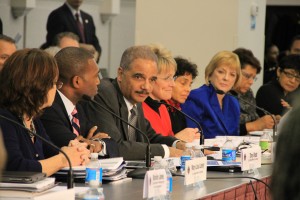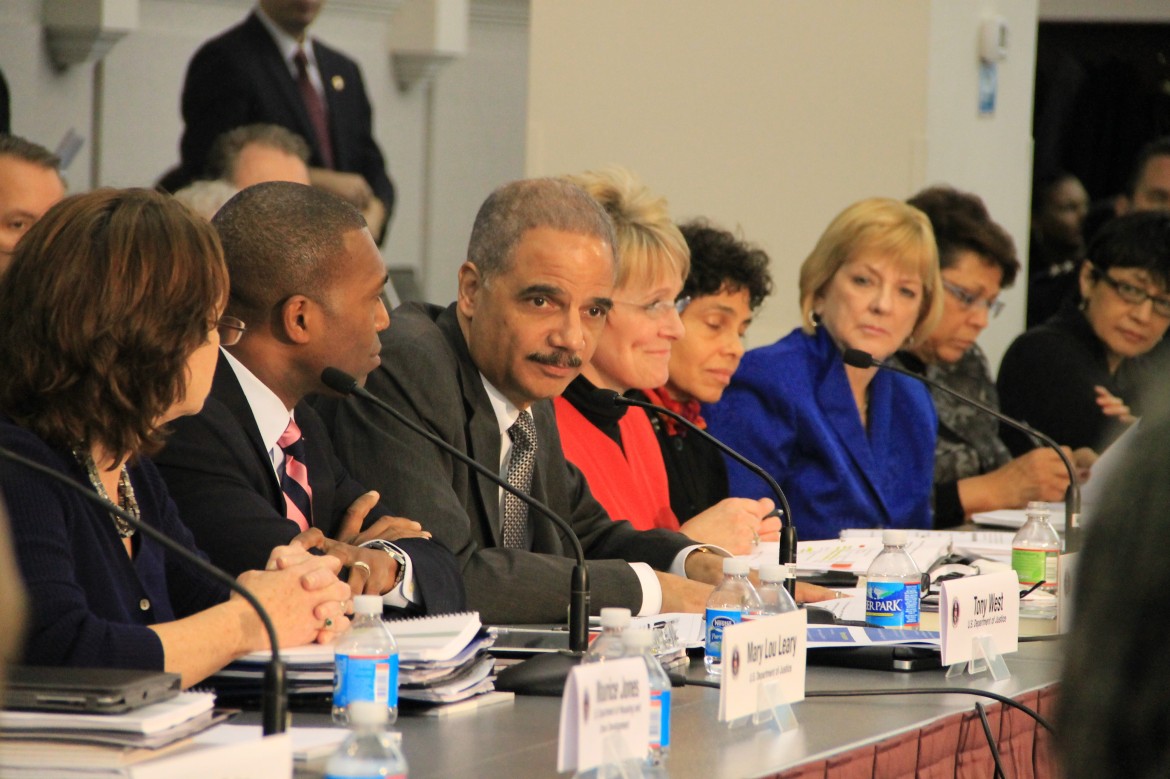
Acting Assistant Attorney General Mary Lou Leary, Acting Associate Attorney General Tony West, U.S. Attorney General Eric Holder and Acting Administrator of the OJJDP, Melodee Hanes, at a federal interagency meeting on juvenile justice Wednesday. Photo by Kaukab Jhumra Smith.
WASHINGTON, D.C. - Two out of three children in the United States experience or witness violence, crime or abuse while growing up, a public health crisis that harms their emotional, physical and intellectual development and makes them more likely to perpetrate the same trauma upon their own children, a national task force appointed by U.S. Attorney General Eric Holder said this week.
The long-term well-being of the country is at stake unless federal and local governments and their communities act to reduce the incidence and impact of such trauma upon young Americans, the National Task Force on Children Exposed to Violence concluded in its final report.
The report detailed 56 policy recommendations for reducing such exposure to trauma and treating its fallout. Such exposure could occur anywhere, the report said: at home, at school, in the community and on the Internet.
“There is a moral component to this question,” Holder said at a public meeting of the federal interagency Coordinating Council for Juvenile Justice and Delinquency Prevention, which approved the report’s release. “This is about what kind of America do you want to have. This is a question of who we are as a nation.”
The imperative to act on the epidemic was not simply moral, it was economic, Holder said. A person impacted by childhood trauma who went “down a criminal path” would cost the country $3 million over his or her lifetime, Holder said. “By contrast, the cost of effective prevention is typically only a few hundred or a few thousand per person.”
The task force’s report emphasized that argument. “The financial costs of children’s exposure to violence are astronomical. The financial burden on other public systems, including child welfare, social services, law enforcement, juvenile justice, and, in particular, education, is staggering when combined with the loss of productivity over children’s lifetimes,” it read.
The outcomes are worst for children whose exposure to trauma goes unnoticed and who don’t receive support from parents, caregivers or their communities, said Dr. Steven Marans, a member of the task force and a professor of psychiatry at Yale University’s Child Study Center and School of Medicine.
Co-chaired by baseball legend Joe Torre, who grew up aware of his mother’s abuse at the hands of his father and who now heads a foundation against domestic violence, the task force based its recommendations upon the latest available research and testimonials from public hearings attended by community residents, researchers, child welfare workers and advocates from 27 states and the District of Columbia.
The task force examined different programs, strategies and services to help young people develop and thrive, said task force member Georgina Mendoza, the director for community safety in Salinas, Calif. It found that the most promising programs are those that take a multidisciplinary and multi-jurisdictional approach and coordinate responses between agencies and organizations serving the same populations, she said.
“There are so many different aspects of people’s lives. They don’t live in a silo’ed world. We do,” Mendoza said of child welfare practitioners.
Agencies that serve children and families should also develop their understanding of the cultural origins of members of their community and incorporate within their programming the challenges faced by children of immigrants, rural communities, tribal communities, inner cities and other marginalized groups, Mendoza said.
Young people who break the law should be screened for their exposure to violence and trauma as part of the standard of care at juvenile justice facilities, and should be prosecuted within the juvenile system and not in the adult criminal justice system, said Robert Listenbee Jr., the co-chair of the task force and the chief of the juvenile unit at the Defender Association of Philadelphia.
Young people must be included in community efforts to address their exposure to violence and crime and allowed to develop leadership within them, Mendoza said. If young people are not consulted, she said, they will not feel ownership or accountability over those efforts and the efforts will fail.
Holder upheld participation by young people as a key part of the solution. “I do think that involving our young people in this effort and reaching out other young people will make this much more effective,” Holder said.
The findings of the task force will play a critical role in guiding federal and local efforts for years to come, Holder said.
“We have to keep pushing to raise the consciousness of the American people about the nature, the depth and breadth of this problem,” Holder said. “This is not going to be shelved. This will be a priority for the Justice Department and for this administration.”
